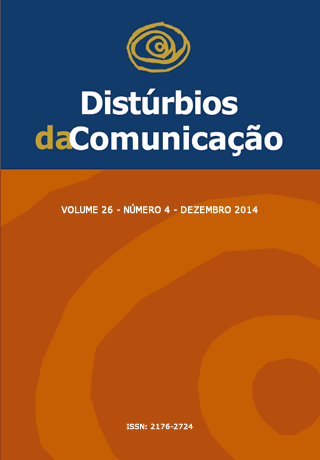Study of audiological evaluations and cognitive function in institutionalized elderly people with suspected hearing loss
Keywords:
Hearing loss, aged, homes for the aged, cognition, auditory perceptionAbstract
Objective: The purpose of this search was to study a group of institutionalized elderly people withsuspected hearing loss regarding gender, age, education and to compare the results of their hearingevaluations of audiometric screening and transient-evoked otoacoustic emissions with their level of selfperceptionof participation restriction and their performance in cognitive functions screening. Method: Itis a case report of ten elderly patients who went through medical evaluation, cognitive screening (MiniMentalState Examination), hearing screening, register and analysis of the transient-evoked otoacousticemissions, who answered the Hearing Handicap Inventory for the Elderly Screening Version questionnaire.Results: Nine of them presented hearing loss in the hearing screening and eight presented absent transientevokedotoacoustic emissions. Six subjects presented some degree of participation restriction throughthe Hearing Handicap Inventory for the Elderly Screening Version and seven of them did not reach thecut-off score of the cognitive screening. Conclusion: Most subjects with suspected hearing loss werewomen, with advanced age, low education level, absence of transient-evoked otoacoustic emissions andmild and moderate degree of hearing loss. It was observed that there is no total compatibility betweenthe Hearing Handicap Inventory for the Elderly Screening Version and the degree of loss by the elderlypatients. It was also observed that the greater the degree of hearing loss, the greater the cognitive deficit.Downloads
Metrics
Downloads
Published
Issue
Section
License
Copyright (c) 2015 Ângela Leusin Mattiazzi, Eliara Pinto Vieira Biaggio, Amanda Dal Piva Gresele, Maristela Julio Costa

This work is licensed under a Creative Commons Attribution 4.0 International License.









